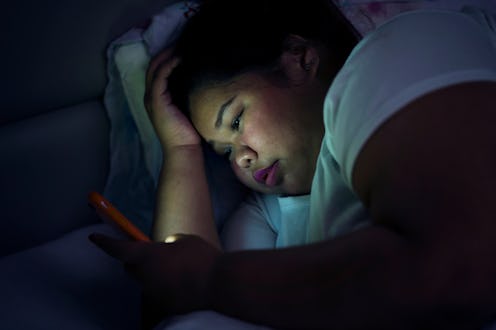Life
New Research Shows That Insomnia Might Be Genetic & That’s Kind Of A Big Deal

If you have trouble sleeping most nights, it might be a struggle you’re born with. Two major new studies published in the journal Nature Genetics say insomnia might be genetic for some people, according to Scientific American. The two studies examined the DNA from millions of individuals, says Scientific American, and researchers found a genetic component to insomnia — including links between insomnia and medical conditions like heart disease and depression. This research doesn't mean that insomnia is a condition that people won't ever be able to move past — rather, this research sets the stage for further investigations that could help people who live with insomnia.
The first study was led by a team at the University of Amsterdam, who analyzed the genomes of more than 1.3 million people. Scientific American says this is the largest genome-wide association study to date, and the researchers used data from UK Biobank, a long-term genetics and health cohort study, and from consumer genetic-testing company 23andMe to conduct the study. The researchers were able to link 202 areas of the genome to insomnia, says Scientific American, which "implicates 956 genes" with insomnia. Previously, only seven genes had been linked to insomnia, according to Scientific American.
The second study was led by a team at Massachusetts General Hospital, who reviewed more than 450,000 genomes from UK Biobank. The researchers identified 78 gene regions associated with sleep duration, including two that were previously unidentified, according to The Harvard Gazette. The researchers found that people carrying genes with the largest number of variants that increased sleep duration reported an average of 22 more minutes of sleep compared to those with the fewest, says The Harvard Gazette.
“Finding 78 areas of the genome that influence habitual sleep duration represents a huge leap forward in our understanding of the mechanisms behind why some people need more sleep than others,” Samuel Jones of the University of Exeter Medical School and co-lead author of the study told The Harvard Gazette. “As part of a wider body of work, our discoveries have the potential to aid the discovery of new treatments for sleep and sleep-related disorders.”
Because various health problems have been associated with poor sleep, says The Harvard Gazette, the researchers also conducted a separate genome-wide association study and identified other genes that contribute to sleep duration that weren’t identified in the larger group analysis. In that analysis, the researchers found a genetic link between “abnormal sleep duration” and depression, type 2 diabetes, and coronary artery disease. The researchers say this further emphasizes the negative health effects getting too little or too much sleep can have, according to The Harvard Gazette.
While this might be one of the largest studies to make a genetic link to insomnia, it’s certainly not the first. A 2018 report published in Molecular Psychiatry also discussed twin studies that found a genetic link to insomnia. These studies also used data from UK Biobank, and the researchers found insomnia-associated genes might contribute to certain health conditions, such as various psychiatric disorders and metabolic disease.
But even if there’s a genetic component to your sleeplessness, that doesn’t mean you’re doomed to never sleep. Mayo Clinic says good sleep hygiene can help insomnia, like maintaining a regular sleep schedule, getting physical activity, and trying not to take naps. There are also a lot of relaxation techniques you can try, says Mayo Clinic, like progressive muscle relaxation, biofeedback, or even breathing exercises at bedtime. While not all of these will be guaranteed cures, talking to your doctor about your sleep troubles can help lead to solutions.
It might sound a little disheartening at first to hear your insomnia might be inherited, but know that doesn’t mean there’s nothing you can do about those sleepless nights. There are tons of tools available to help you get better sleep. Knowing what’s causing your insomnia is half the battle — now you can get out there and conquer it.
This article was originally published on